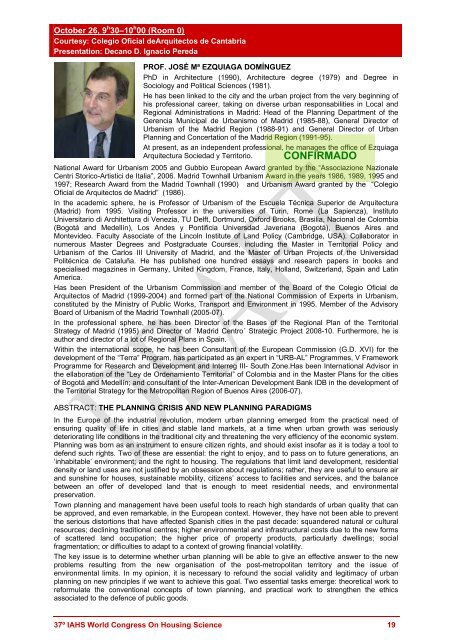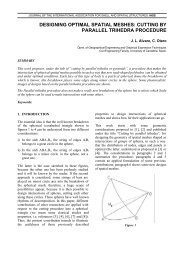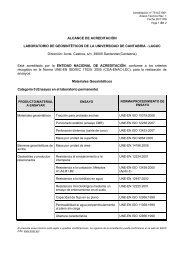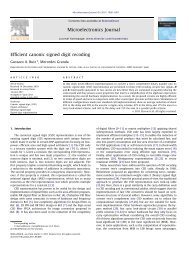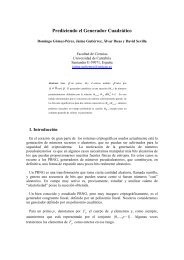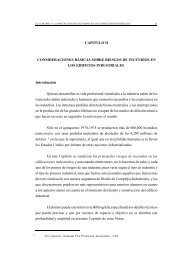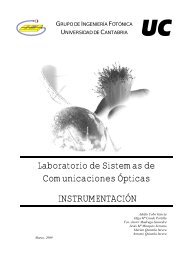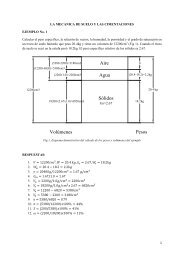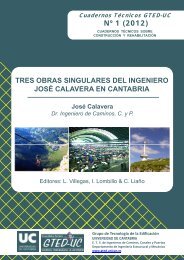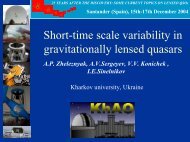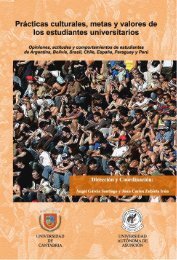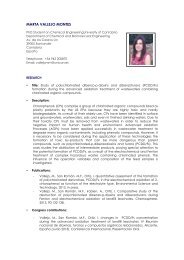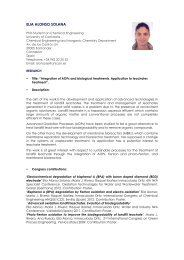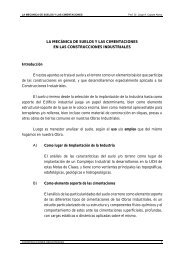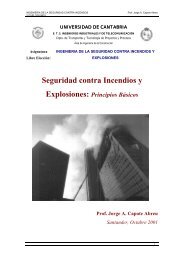37º IAHS World Congress on Housing: - Universidad de Cantabria
37º IAHS World Congress on Housing: - Universidad de Cantabria
37º IAHS World Congress on Housing: - Universidad de Cantabria
- No tags were found...
You also want an ePaper? Increase the reach of your titles
YUMPU automatically turns print PDFs into web optimized ePapers that Google loves.
October 26, 9 h 30–10 h 00 (Room 0)Courtesy: Colegio Oficial <strong>de</strong>Arquitectos <strong>de</strong> <strong>Cantabria</strong>Presentati<strong>on</strong>: Decano D. Ignacio PeredaPROF. JOSÉ Mª EZQUIAGA DOMÍNGUEZPhD in Architecture (1990), Architecture <strong>de</strong>gree (1979) and Degree inSociology and Political Sciences (1981).He has been linked to the city and the urban project from the very beginning ofhis professi<strong>on</strong>al career, taking <strong>on</strong> diverse urban resp<strong>on</strong>sabilities in Local andRegi<strong>on</strong>al Administrati<strong>on</strong>s in Madrid: Head of the Planning Department of theGerencia Municipal <strong>de</strong> Urbanismo of Madrid (1985-88), General Director ofUrbanism of the Madrid Regi<strong>on</strong> (1988-91) and General Director of UrbanPlanning and C<strong>on</strong>certati<strong>on</strong> of the Madrid Regi<strong>on</strong> (1991-95).At present, as an in<strong>de</strong>pen<strong>de</strong>nt professi<strong>on</strong>al, he manages the office of EzquiagaArquitectura Sociedad y Territorio. CONFIRMADONati<strong>on</strong>al Award for Urbanism 2005 and Gubbio European Award granted by the “Associazi<strong>on</strong>e Nazi<strong>on</strong>aleCentri Storico-Artistici <strong>de</strong> Italia”, 2006. Madrid Townhall Urbanism Award in the years 1986, 1989, 1995 and1997; Research Award from the Madrid Townhall (1990) and Urbanism Award granted by the “ColegioOficial <strong>de</strong> Arquitectos <strong>de</strong> Madrid” (1986).In the aca<strong>de</strong>mic sphere, he is Professor of Urbanism of the Escuela Técnica Superior <strong>de</strong> Arquitectura(Madrid) from 1995. Visiting Professor in the universities of Turin, Rome (La Sapienza), InstitutoUniversitario di Architettura di Venezia, TU Delft, Dortmund, Oxford Brooks, Brasilia, Naci<strong>on</strong>al <strong>de</strong> Colombia(Bogotá and Me<strong>de</strong>llín), Los An<strong>de</strong>s y P<strong>on</strong>tificia Universdad Javeriana (Bogotá), Buenos Aires andM<strong>on</strong>tevi<strong>de</strong>o. Faculty Associate of the Lincoln Institute of Land Policy (Cambridge, USA). Collaborator innumerous Master Degrees and Postgraduate Courses, including the Master in Territorial Policy andUrbanism of the Carlos III University of Madrid, and the Master of Urban Projects of the <strong>Universidad</strong>Politécnica <strong>de</strong> Cataluña. He has published <strong>on</strong>e hundred essays and research papers in books andspecialised magazines in Germany, United Kingdom, France, Italy, Holland, Switzerland, Spain and LatinAmerica.Has been Presi<strong>de</strong>nt of the Urbanism Commissi<strong>on</strong> and member of the Board of the Colegio Oficial <strong>de</strong>Arquitectos of Madrid (1999-2004) and formed part of the Nati<strong>on</strong>al Commissi<strong>on</strong> of Experts in Urbanism,c<strong>on</strong>stituted by the Ministry of Public Works, Transport and Envir<strong>on</strong>ment in 1995. Member of the AdvisoryBoard of Urbanism of the Madrid Townhall (2005-07).In the professi<strong>on</strong>al sphere, he has been Director of the Bases of the Regi<strong>on</strong>al Plan of the TerritorialStrategy of Madrid (1995) and Director of `Madrid Centro´ Strategic Project 2008-10. Furthermore, he isauthor and director of a lot of Regi<strong>on</strong>al Plans in Spain.Within the internati<strong>on</strong>al scope, he has been C<strong>on</strong>sultant of the European Commissi<strong>on</strong> (G.D. XVI) for the<strong>de</strong>velopment of the “Terra” Program, has participated as an expert in “URB-AL” Programmes, V FrameworkProgramme for Research and Development and Interreg III- South Z<strong>on</strong>e.Has been Internati<strong>on</strong>al Advisor inthe ellaborati<strong>on</strong> of the “Ley <strong>de</strong> Or<strong>de</strong>namiento Territorial” of Colombia and in the Master Plans for the citiesof Bogotá and Me<strong>de</strong>llín; and c<strong>on</strong>sultant of the Inter-American Development Bank IDB in the <strong>de</strong>velopment ofthe Territorial Strategy for the Metropolitan Regi<strong>on</strong> of Buenos Aires (2006-07).ABSTRACT: THE PLANNING CRISIS AND NEW PLANNING PARADIGMSIn the Europe of the industrial revoluti<strong>on</strong>, mo<strong>de</strong>rn urban planning emerged from the practical need ofensuring quality of life in cities and stable land markets, at a time when urban growth was seriously<strong>de</strong>teriorating life c<strong>on</strong>diti<strong>on</strong>s in the traditi<strong>on</strong>al city and threatening the very efficiency of the ec<strong>on</strong>omic system.Planning was born as an instrument to ensure citizen rights, and should exist insofar as it is today a tool to<strong>de</strong>fend such rights. Two of these are essential: the right to enjoy, and to pass <strong>on</strong> to future generati<strong>on</strong>s, an‘inhabitable’ envir<strong>on</strong>ment; and the right to housing. The regulati<strong>on</strong>s that limit land <strong>de</strong>velopment, resi<strong>de</strong>ntial<strong>de</strong>nsity or land uses are not justified by an obsessi<strong>on</strong> about regulati<strong>on</strong>s; rather, they are useful to ensure airand sunshine for houses, sustainable mobility, citizens’ access to facilities and services, and the balancebetween an offer of <strong>de</strong>veloped land that is enough to meet resi<strong>de</strong>ntial needs, and envir<strong>on</strong>mentalpreservati<strong>on</strong>.Town planning and management have been useful tools to reach high standards of urban quality that canbe approved, and even remarkable, in the European c<strong>on</strong>text. However, they have not been able to preventthe serious distorti<strong>on</strong>s that have affected Spanish cities in the past <strong>de</strong>ca<strong>de</strong>: squan<strong>de</strong>red natural or culturalresources; <strong>de</strong>clining traditi<strong>on</strong>al centres; higher envir<strong>on</strong>mental and infrastructural costs due to the new formsof scattered land occupati<strong>on</strong>; the higher price of property products, particularly dwellings; socialfragmentati<strong>on</strong>; or difficulties to adapt to a c<strong>on</strong>text of growing financial volatility.The key issue is to <strong>de</strong>termine whether urban planning will be able to give an effective answer to the newproblems resulting from the new organisati<strong>on</strong> of the post-metropolitan territory and the issue ofenvir<strong>on</strong>mental limits. In my opini<strong>on</strong>, it is necessary to refound the social validity and legitimacy of urbanplanning <strong>on</strong> new principles if we want to achieve this goal. Two essential tasks emerge: theoretical work toreformulate the c<strong>on</strong>venti<strong>on</strong>al c<strong>on</strong>cepts of town planning, and practical work to strengthen the ethicsassociated to the <strong>de</strong>fence of public goods.37º <str<strong>on</strong>g>IAHS</str<strong>on</strong>g> <str<strong>on</strong>g>World</str<strong>on</strong>g> <str<strong>on</strong>g>C<strong>on</strong>gress</str<strong>on</strong>g> On <strong>Housing</strong> Science 19


